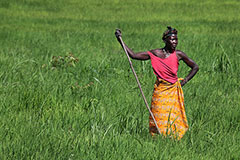Motivation
In 2006, IFPRI began collaborating with the West and Central African Council for Agricultural Research and Development (CORAF/WECARD) and ECOWAS to identify the most effective ways to promote growth in agricultural productivity at the subsector level across West and Central African countries. The collaboration, supported by CORAF/WECARD, has been part of an effort to align agricultural research and development investment and policies with CAADP priorities. The priority-setting process considers the role of broad agricultural growth, as well as growth in each of the main agricultural subsectors. In addition, regional trade’s potential to promote agricultural growth and generate income for farmers (nationally and regionally) has been considered.
A comprehensive analytic framework, integrating economywide modeling with spatial tools to identify agroecological potential and yield gaps across all agroecological zones, was developed for the priority-setting analysis. Using this analytical framework, IFPRI research results identified the need to:
- spur productivity growth, particularly in subsectors that elicit high demand within West Africa, such as livestock and cereals (especially rice), cassava, and other staple crops;
- strengthen regional agricultural markets, trade, and economic integration;
- enhance linkages between agricultural and nonagricultural sectors; and
- exploit opportunities for greater regional cooperation and harmonization.
Outcomes
Research results were used by regional stakeholders in consultations on the strategic options and priorities for future research and development investments at both the national and regional levels. The team’s research results on the linkages among various growth options and levels of poverty reduction have contributed significantly to the policy debate on development strategy priorities. These results guided CORAF/WECARD in its institutional strategy.



